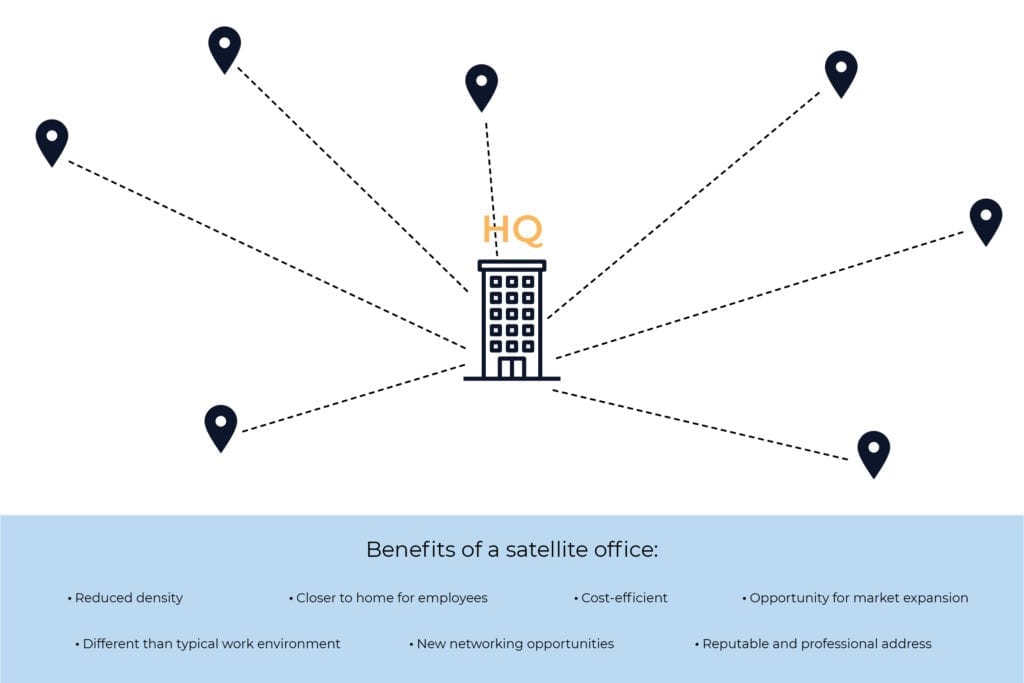
Today’s new normal has given rise to new workforce conditions that has forced all types of companies to re-evaluate their real estate footprint.
We’ve seen companies downsize from one large headquarters and expand to multiple smaller office locations.
We’ve seen others aim to reduce the density of their corporate office by providing easily accessible workspace locations closer to home.
We’ve even seen the total elimination of a centralized headquarters in exchange for various flex office approaches.
While each of these approaches are unique and effective in their own way, the addition of satellite offices has remained constant.
So, What Is a Satellite Office?
Simply put, a satellite office is a branch or a part of a company that is physically separate from the organization’s main office and is typically smaller than headquarters.
A satellite office could be located as far as 500 miles away from main operations or as close as the building next door.
What Types of Companies Utilize Satellite Offices?
Growing companies that lack space:
As a company grows and expands, the addition of new team members becomes essential. Even with today’s abundance of work being done from a remote capacity, adding more employees means that more physical space is required to safely place them.
Companies seeking collaborative environments:
While many companies have seen zero change in work productivity from a remote capacity, others have found that physical collaboration is crucial to fostering the best work possible. Adding satellite offices can give teams more space to safely collaborate in.
Companies looking to reduce density:
The spread of the novel coronavirus has forced many companies to temporarily close their once bustling and crowded corporate offices. Many are now looking to utilize a flex office model – adding several satellite offices – that can allow for adequate social distancing and safe physical work.
Companies exploring new markets in different locations:
For those looking to expand across state lines or international borders, adding a satellite office is the cost-efficient way to open new locations in multiple markets – rather than having to open an entirely new headquarters.
Companies seeking status locations:
Prestige of location seems to be garnering greater importance and opening a satellite office in a status location can instantly provide this for a company looking to open up shop at a coveted address.
New companies wanting to reduce costs:
Temporary satellite offices are the cost-efficient alternative to having to worry about expensive construction costs or complicated rental agreements of a larger, long-term headquarter office.
Larger companies looking to relocate a department or team:
Also a cheaper alternative, rather than placing a department or a team in a brand-new office, satellite offices give companies the ability to relocate these employees wherever they may need to.
What Are the Benefits of Satellite Offices?
Different than typical work environment:
The opposite of a large, crowded corporate office, satellite offices are an attractive, alternative work environment for today’s employees. Often away from city centers, satellite offices are also easier for team members to commute to as they’re closer to home.
Cost efficient:
Satellite offices can save thousands when it comes to construction costs and rental agreements. Companies can also downsize on space and utilize a floating approach, where employees can tailor their own schedules and access the workspace when they want to – rather than everyone being in the space at once.
Reputable and professional address:
Satellite offices are located at reputable and professional addresses that provide instant business presence as well as an impressive place to meet with potential clients.
Increased networking opportunities:
Within smaller satellite offices are usually other companies taking the same approach, giving tenants of the building the ability to network with each other and form new, beneficial connections.
Reap the “local” benefits:
Adding a satellite office in a new market can allow a company to better engage with the local talent in the area and to even partner with other local businesses – both within the satellite office and in the community.
How Does a Company Identify if a Satellite Office Is Right for Them?
There are several key components to consider when choosing if a satellite office is right for a company such as:
- Highlight your company’s short-term and long-term goals and aspirations. Does a satellite office benefit these current or future goals?
- How will a satellite office change your company’s brand or office culture? Will it alter these components in a positive or negative way?
- Will the addition of a satellite office improve a team or departments working dynamic?
- Does the satellite office satisfy space and layout requirements to safely house your employees?
- Does the satellite office meet the technological needs of your company?
- Does the satellite office have the infrastructure and facilities to allow your employees to have a holistic workday experience?
Lastly, How Does One Manage a Satellite Office or Multiple Satellite Offices?
It is important to remember that with the addition of a single satellite office or multiple satellite offices, that you’re actively expanding and placing team members in new roles, new locations, and giving them new responsibilities.
- Here are several components to consider when managing new satellite offices:
- Can company benefits remain uniform across all offices – both at headquarters and at each satellite office?
- How will each satellite office be included in all company communications?
- How will your company maintain and communicate clear, equitable business objectives, expectations, and strategies to satellite offices?
- How will company culture be followed at each satellite office?
- Can you work with an office network – like Preferred Office Network – that can help the streamline of your satellite office portfolio?



